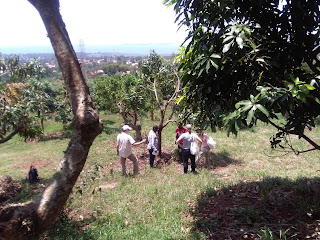On the Friday of the conference, we left the
conference setting and had a few options on how we wanted to spend that day.
There were three options for the day, and I selected the farm visit. This was
partially because I was interested to see how this particular farm worked, but
also because it meant I’d score a free ride back to Jinja!
We left the resort where the conference was held at
7:20AM. We had intended to arrive at the farm, located just outside of Jinja,
between 9 and 9:30. But, with traffic and getting a bit lost trying to leave
Kampala, we were there just after 10. So, with a few modifications, we happily
sipped on some tea made from ingredients picked that morning from the garden (I
had lemongrass – and it was wonderful!), and snacked on a few items while we
learned about how Busiano Farms and Trees came to be.
Patrick Kiirya and his wife, Judith run the operation.
They mainly have what is called a forest garden, as the majority of what they
are producing is grown amongst the foresty area where they live. They have a
wide range of crops being grown, some livestock, and even a few
herbal/medicinal* gardens.
 |
| A view from a very small part of the farm. In the distance is Lake Victoria. Not too shabby, if I may say so myself! |
It was really neat to walk around the property**
seeing all of the different sections and a few of their experiments. For me,
the most interesting were their water harvesting mechanisms. As this was a
topic of concern in many of the discussions I’d had when I’d travelled
upcountry last time I was in Uganda, I found it quite interesting to see their
take on such an innovation. It’s a new addition to the site, so they weren’t
entirely sure how it would work, but I look forward to checking in with them as
the rainy season progresses.
But, perhaps what makes this undertaking even more
special, is that Patrick and his wife are trying to transition the focus away
from solely being an agricultural operation to becoming an AgriTourism hotspot.
They already have a few indoor accommodations, but they are planning a few
sections of the property for interested visitors to camp. They also have a few
spots where events can be held, such as weddings!
Patrick and Judith both welcomed us with such
openness, as they showed us around their property and introduced us to some of
the youth who were working there. It was quite interesting to see a new way of
food production, aside from the traditional Canadian method.
 |
| Stephen (in the red shirt) is one of the youths working on the farm. Here he is teaching participants about the homemade natural pesticide techniques used on the farm. |
 |
| Me in my ESST glory - planting trees while wearing flannel! |
Thankfully this place is only a few minutes drive from
where I’m currently living, so I hope to be able to visit from time to time.
There is so much more that I could learn from here, and from Patrick and his
wife.
But the welcome week didn't just end there. The following day, I was briefly visited by the remainder of my old co-workers who were on their way back from a field visit in Soroti. It was so great to spend a few minutes with them, despite the heavy rain, and despite how tired they must have been! It also meant I got to meet my replacement, also named Emily!
 |
| The FRA crew. Can you guess which one is the newest Emily?! |
So with a conference and farm visit complete, it is time to take little break to get reacquainted before I get back to work!
-the Orange Canadian













